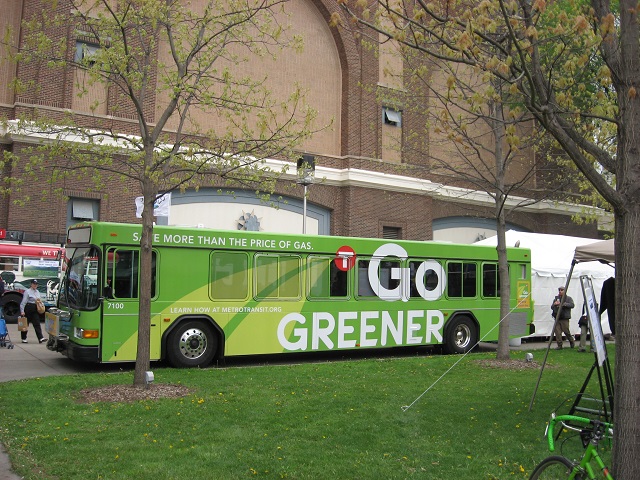
Randy Stern from Minneapolis, MN, USA, CC BY 2.0 , via Wikimedia Commons
In an age where transportation is an essential factor of life, we should undoubtedly consider if there are more beneficial methods of transport than just cars, trucks, and the like. Luckily, because of this, many people are left turning to other transportation methods, such as trains, buses, or the metro.
Still, this begs the question - do these methods reduce greenhouse gas emissions? For buses specifically, does bus transit reduce greenhouse gas emissions? The short answer is yes - bus transit undoubtedly reduces greenhouse gas emissions compared to other forms of transportation.
Why is this the case, though? For starters, public transport saves gas, provides a more efficient method of travel, and allows more accessible mandates and control over our emissions.
There are many methods, though, and this is hardly the complete picture.

NASA’s Scientific Visualization Studio, (Eric Fisk), CC BY-SA 4.0, via Wikimedia Commons
How Does Transit Help the Climate?
So how specifically does bus transit reduce greenhouse gas emissions and help the climate? Ultimately, there are several reasons why bus transportation is far better than alternative methods, but most of this stems from reducing the use of fuel.
It's estimated that public transportation saves over 1.4 billion gallons of gas every year. The very fact it saves this much gas alone should be evidence that bus transit is more than efficient when helping the environment and reducing our emissions.
Beyond this, there is empirical data that implies the benefits of bus transportation as well, arguing that it is an incredibly efficient and valuable way to travel with the environment in mind.
Although like with anything, people do have disagreements on whether or not buses are, in fact, an eco-friendly and efficient method of transportation, it does seem that the overwhelming majority of data support the idea that they are.
In the end, transit helps the climate by reducing the emissions caused by motor vehicles. If people have an eco-friendly alternative to using their cars or trucks, this can reduce emissions by a lot.
Add this to saving gas, and you have an extremely effective way to help the climate by using transit like buses.
Electric vs. Diesel vs. Natural Gas: Which Bus Is Best for the Climate?
Although it's clear that buses are overall much more eco-friendly than the alternative, many questions about what types of buses to use and how to implement a bus system remain.
One of the most common questions which arise is what fuel source is the most emission-reduced and the best for the climate?
After all, there are three main bus fuel types available - electric, diesel, and natural gas fuels. These widely varying fuel sources are all more efficient than the usage of cars and other vehicles for transportation, but that doesn't mean that we're unable to narrow down the efficiency and emission reduction even further.
It's increasingly common to see electric buses or similar battery-driven hybrid buses on the streets. Although these are undoubtedly growing in popularity, the question remains - are they better for the environment than their gas brothers?
The answer is an emphatic yes. Electric buses are up to 3x more efficient than their counterparts. Although this may not sound like a lot at first, it's an incredible jump in efficiency. Keep in mind that normal buses may be more efficient than cars or other personal transport systems, but these electric buses are even more efficient than that.
If you were to picture exactly how much more, a good example would be to imagine that three electric buses could run and produce the exact same carbon emissions as one gas diesel.
Beyond this, electric buses are better than even diesel and natural gas hybrid transport vehicles. This makes these electric buses easily the most efficient option on the market.
Methane Emissions and Global Warming Potential
Methane emissions are very dangerous when it comes to the global warming potential that our society is facing. It's clear that scientists are in agreement - global warming is a very real and pressing issue.
Our society has decided to do everything in its power to prevent this global warming and remove and stall any effects possible. Because of this, many people are wondering exactly who or what will accomplish this. Will we be forced to cut back on the production of this or that, or maybe even switch to a more green food source?
Cutting back on the usage of fuel is definitely one crucial way of getting rid of our greenhouse emissions, and because of this, the use of buses in transit should be considered without a doubt.
Using buses in transit will save an immense amount of fuel in comparison to the regular vehicles people use. The fact that these buses are more efficient, of course, is a very strong argument for the use of buses as opposed to their less fuel-efficient counterparts.
Fuel Efficiency
Fuel efficiency is one of the major reasons that the use of buses in transit is as efficient as it is. Keep in mind that although buses, as a singular vehicle, do have fewer miles to the gallon than a regular car, these vehicles also transport many more people.
Although on the surface, it may seem that buses expend more fuel for the distance they travel, these vehicles are much more compact and can much more easily fit many passengers into their seats than a car.
Because of this, you not only gain the benefit of reduced traffic and much easier transportation, but you also gain the benefit of a significantly higher level of fuel efficiency per person.
Although this may not always be the case, it's not a stretch to imagine how much more effective a bus can be in transporting a city's citizens.
It's also important to note that this efficiency leads to other benefits as well. Not only is the use of buses efficient when it comes to saving the planet and helping with greenhouse gas, but it's also much less time-consuming for commuters.
On average, one study estimated that commuters saved, on average, 28 whole days per year simply by commuting by buses instead of their vehicles. This incredible fact should bear witness to the fact that both the fuel and time efficiency of buses are incredibly higher than personal vehicles' efficiency.
Six Ways to Improve Bus Transit Use and Experience
Although the use of buses is undoubtedly more efficient than other vehicles, there's always room for improvement. Because of that, here are six ways you should consider improving your bus transit use and experience.
1. Planning
Planning is a key factor in improving the efficiency of any bus transit use which may take place. By planning streets properly to make sure that buses can get around and gain access to the locations they may need you, you can easily ensure that buses don't become late, have delays, or even get into accidents due to improper planning.
Efficiency is critical, and proper planning is the key to efficiency. Without proper planning or efficiency, you're also looking at burning more fuel and electricity than if the bus routes are easy to follow and adhere to strict guidelines.
2 Reliability
The reliability of the system is important. If your bus transit system fails to be reliable, this will increase overall emissions per capita due to fewer commuters opting in to use your bus system.
Increasing the reliability of the buses and the overall bus system can do wonders for the transit experience.
It's imperative that bus arrival times are frequent, not often late, and are not delayed due to traffic or weather.
3 Maintain the System
Maintaining the system is an absolute must for any bus transit system. Because maintaining the system is key to improving the safety, mileage, and performance of the buses, you should do it regularly and accurately.
If you fail to maintain the system, both the transit use and experience will suffer, and fewer people will use the resource available to them.
4 Keep the Buses Clean
Keeping your buses clean is one of the crucial parts of improving the experience of your transit system. Although this may be obvious, cleaning your buses frequently should be an expected part of providing a transit system.
By doing this, you ensure the quality of experience for any commuters is top notch and doesn't falter depending on the bus they take. This is also a way to improve the overall feedback from bus goers and increase the number of people deciding to use the bus instead of their vehicle.
In this manner, cleaning buses frequently can actually be a way to improve your greenhouse gas emissions.
5 Create Hierarchy
Creating hierarchy can be a useful method by which to increase the effectiveness of your bus system. This means that the system should follow a method and stick to it. You should not allow this system to falter, or it will become much less efficient.
6 Increase Speed
Having an increase in speed is almost always going to lead to a better and smoother system overall. Keep in mind that if your goal is to provide a service that gets people from point A to point B, the best way to do this is fast and safely.
Once your system is verifiably safe, then the only remaining modification should be increasing the speed of the transit system.
Social, Environmental, and Economic Impacts of Bus Rapid Transit
Undoubtedly, rapid bus transit provides social, environmental, and even economic benefits to cities and citizens. However, keep in mind that this is still a relatively new industry, and the information we do have on it is niche.
With that being said, it does appear that using a rapid bus transit system can improve the overall climate of a city's transportation.
For starters, using rapid bus transit saves citizens' time, which improves the economic tide of the city and surrounding areas. The use of buses also improves social cohesion and, by extension, can increase overall public satisfaction.
These reasons are undoubtedly enough to implement a bus transit system, but there are, without a doubt, many more reasons.
Ways Cities Benefit From Bus Rapid Transit (BRT)
Cities will benefit from Bus Rapid Transit systems in many ways. Keep in mind that a Bus Rapid Transit system is a quickly-expanding and highly successful system that relies on unique and separate routes for buses to increase efficiency.
BRT systems increase the health of passengers due to increased exercise, improved travel safety, and much more. Because of this, these systems are finding success throughout the world.
Conclusion
Using a rapid bus transit system in a city can help keep the environment clean, reduce emissions and littering, save time for commuters, and save money for a city in the long run.
Using buses also decreases traffic and much more, so this should be considered for any city or even town. Implementing the system may be an investment, but overall the benefits to the environment, economy, and satisfaction are clear.
Although maintaining the system and ensuring that your buses function and follow proper safety protocol is critical, using a rapid bus transit system is easily a great idea.
So long as you follow common-sense strategies, improve roads for the efficiency of buses, and use several other methods, this is an easy way to go eco-friendly while providing public transport.
Keep in mind that electric buses are 3x as efficient as diesel buses, which are even more efficient when compared to regular vehicles.
Why not improve your efficiency?



